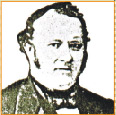MENIERE’S DISEASE
 In
1861, on what proved to be his death-bed. Prosper Meniere,
Director of the Paris Institution for Deaf-Mutes, described
an affliction characterised by sudden attacks of deafness,
noise in the ear, pallor, nausea and giddiness. The onset
usually occurs between 40 and 60 years of age. In about a
quarter of cases, the opposite ear later becomes affected.
The disease is associated with distension of the membranous
labyrinth due to Increased endolymphatic pressure, but the
underlying cause remains unknown. A brilliant scholar and
a well-known otologist of his day, Meniere died shortly after
this epoch- making paper, which was to perpetuate his name
had appeared. In
1861, on what proved to be his death-bed. Prosper Meniere,
Director of the Paris Institution for Deaf-Mutes, described
an affliction characterised by sudden attacks of deafness,
noise in the ear, pallor, nausea and giddiness. The onset
usually occurs between 40 and 60 years of age. In about a
quarter of cases, the opposite ear later becomes affected.
The disease is associated with distension of the membranous
labyrinth due to Increased endolymphatic pressure, but the
underlying cause remains unknown. A brilliant scholar and
a well-known otologist of his day, Meniere died shortly after
this epoch- making paper, which was to perpetuate his name
had appeared. |
Meniere was born at Angers,
on the Loire, the third of four children of a tradesman. He
received his early education at the Lycee of his native town,
and went to Paris to study for the medical profession in 1819.
His student career was a brilliant one. He was awarded a Gold
Medal in 1826. and obtained his M.D. in 1828. He was acting
as clinical assistant to baron Dupuytren at the Hotel Dieu,
at the time of the political trouble of July and August, 1830.
when more than 2,000 wounded rioters were admitted to the
hospitals of Paris in one day. Meniere wrote a vivid account
of his experiences in the casualty department of the-Hotel
Dieu, and later this was published in book form.
In. 1832 Meniere was appointed
assistant professor in the Paris faculty of medicine, but
his career was Interrupted in an unexpected manner. At the
suggestion of a friend who was an eminent medicolegal expert,
Meniere was nominated by the government of King Louis Philippe
to ascertain whether the Duchesse de Berry was pregnant. The
Duchess, who was the widow of the murdered Due de Berry, son
of Charles X of Prance, had landed near Marsellle In April,
1832, In an attempt to secure the throne for her 11-year-old
son. Her followers were captured and Imprisoned In the castle
of Blays. Menlere found that the Duchess was pregnant, and
in due course she gave birth to a daughter, the fruit of a
secret marriage to an Italian nobleman. The discovery of this
marriage and the arival of the baby deprived the Duchess of
the sympathies of other supporters. No longer an object of
fear to the French government, she was released and Menlere
accompanied her to Naples.
Upon his return to Paris Meniere
acted for a short time as assistant to Professor Chomel.
In 1835 he was sent to the
departments of Aude and Haute-Oaronne to supervise measures
for the prevention of cholera, which was epidemic at the time.
In 1637 he applied for the vacant professorship of medicine
and hygiene, writing a brilliant thesis on clothing and cosmetics.
He was unsuccessful, but In the following year he secured
the appointment of physician-in-chief to the Institution for
Deaf-Mutes, Henceforth his professional work lay almost entirely
In the field of otology. Menlere was a well-known figure In
the Intellectual world of Pario, and was intimate with Balzac,
Victor Hugo and other great writers as well as with the leading
medical men. He was himself a highly cultured man and his
life-long study of the Oreek and Latin classics was responsible
for two learned volumes on Medical Studies on the Latin Poets
and on Cicero as a Physician.
Menlere
married In 1838 Mile, Becquerel, a member of the same family
as Antoinc Becquerel, the discoverer of radioactivity. Their
son, Dr. Emilc Menlere, was also a noted otologist. Prosper
Menlere died on 7th February, 1862, of influenzal pneumonia.
|